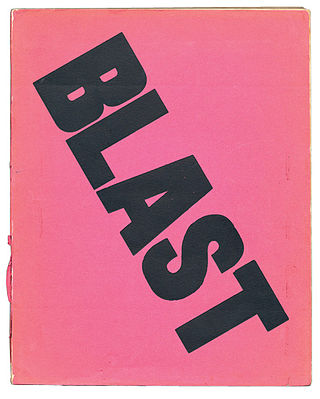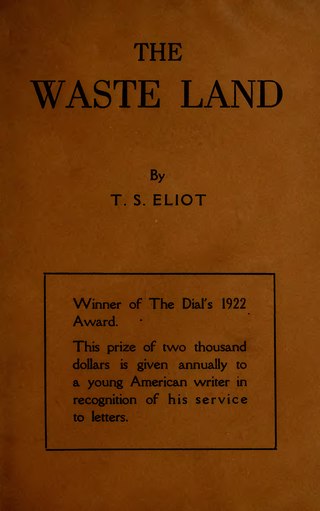
Ezra Weston Loomis Pound was an expatriate American poet and critic, a major figure in the early modernist poetry movement, and a fascist collaborator in Italy during World War II. His works include Ripostes (1912), Hugh Selwyn Mauberley (1920), and his 800-page epic poem, The Cantos (c. 1917–1962).

Imagism was a movement in early-20th-century Anglo-American poetry that favored precision of imagery and clear, sharp language. It is considered to be the first organized modernist literary movement in the English language. Imagism is sometimes viewed as "a succession of creative moments" rather than a continuous or sustained period of development. The French academic René Taupin remarked that "it is more accurate to consider Imagism not as a doctrine, nor even as a poetic school, but as the association of a few poets who were for a certain time in agreement on a small number of important principles".

Vorticism was a London-based modernist art movement formed in 1914 by the writer and artist Wyndham Lewis. The movement was partially inspired by Cubism and was introduced to the public by means of the publication of the Vorticist manifesto in Blast magazine. Familiar forms of representational art were rejected in favour of a geometric style that tended towards a hard-edged abstraction. Lewis proved unable to harness the talents of his disparate group of avant-garde artists; however, for a brief period Vorticism proved to be an exciting intervention and an artistic riposte to Marinetti's Futurism and the post-impressionism of Roger Fry's Omega Workshops.
"In a Station of the Metro" is an Imagist poem by Ezra Pound published in April 1913 in the literary magazine Poetry. In the poem, Pound describes a moment in the underground metro station in Paris in 1912; he suggested that the faces of the individuals in the metro were best put into a poem not with a description but with an "equation". Because of the treatment of the subject's appearance by way of the poem's own visuality, it is considered a quintessential Imagist text.

Basil Cheesman Bunting was a British modernist poet whose reputation was established with the publication of Briggflatts in 1966, generally regarded as one of the major achievements of the modernist tradition in English. He had a lifelong interest in music that led him to emphasise the sonic qualities of poetry, particularly the importance of reading poetry aloud: he was an accomplished reader of his own work.

Blast was the short-lived literary magazine of the Vorticist movement in Britain. Two editions were published: the first on 2 July 1914 and featured a bright pink cover, referred to by Ezra Pound as the "great MAGENTA cover'd opusculus"; and the second a year later on 15 July 1915. Both editions were written primarily by Wyndham Lewis. The magazine is emblematic of the modern art movement in England, and recognised as a seminal text of pre-war 20th-century modernism. The magazine originally cost 2/6.

Sextus Propertius was a Latin elegiac poet of the Augustan age. He was born around 50–45 BC in Assisium and died shortly after 15 BC.
The Seafarer is an Old English poem giving a first-person account of a man alone on the sea. The poem consists of 124 lines, followed by the single word "Amen". It is recorded only at folios 81 verso – 83 recto of the tenth-century Exeter Book, one of the four surviving manuscripts of Old English poetry. It has most often, though not always, been categorised as an elegy, a poetic genre commonly assigned to a particular group of Old English poems that reflect on spiritual and earthly melancholy.

Thomas Ernest Hulme was an English critic and poet who, through his writings on art, literature and politics, had a notable influence upon modernism. He was an aesthetic philosopher and the 'father of imagism'.

The Cantos by Ezra Pound is a long, incomplete poem in 120 sections, each of which is a canto. Most of it was written between 1915 and 1962, although much of the early work was abandoned and the early cantos, as finally published, date from 1922 onwards. It is a book-length work, widely considered to present formidable difficulties to the reader. Strong claims have been made for it as the most significant work of modernist poetry of the twentieth century. As in Pound's prose writing, the themes of economics, governance and culture are integral to its content.

Mary de Rachewiltz is an Italian-American poet and translator.

Mary Ethel Barnard was an American poet, biographer and Greek-to-English translator. She is known for her elegant rendering of the works of Sappho, a translation which has never gone out of print.
Links to nations or nationalities point to articles with information on that nation's poetry or literature. For example, United Kingdom links to English poetry and Indian links to Indian poetry.
Nationality words link to articles with information on the nation's poetry or literature.
Nationality words link to articles with information on the nation's poetry or literature.

The Waste Land is a poem by T. S. Eliot, widely regarded as one of the most important poems of the 20th century and a central work of modernist poetry. Published in 1922, the 434-line poem first appeared in the United Kingdom in the October issue of Eliot's The Criterion and in the United States in the November issue of The Dial. It was published in book form in December 1922. Among its famous phrases are "April is the cruellest month", "I will show you fear in a handful of dust", and the Sanskrit mantra "Shantih shantih shantih".

A Lume Spento is a 1908 poetry collection by Ezra Pound. Self-published in Venice, it was his first collection.

Cathay (1915) is a collection of classical Chinese poetry translated into English by modernist poet Ezra Pound based on Ernest Fenollosa's notes that came into Pound's possession in 1913. At first Pound used the notes to translate Noh plays and then to translate Chinese poetry to English, despite a complete lack of knowledge of the Chinese language. The volume's 15 poems are seen less as strict translations and more as new pieces in their own right; and, in his bold translations of works from a language he was unfamiliar with, Pound set the stage for modernist translations.
William Brooke Smith was an American painter and friend of Ezra Pound. His death from tuberculosis greatly affected Pound, who dedicated his first poetry collection, A Lume Spento, to Smith.

John Gery is an American poet, critic, collaborative translator, and editor. He has published seven books of poetry, a critical work on the treatment of nuclear annihilation in American poetry, two co-edited volumes of literary criticism and two co-edited anthologies of contemporary poetry, as well as, a co-authored biography and guidebook on Ezra Pound's Venice.













